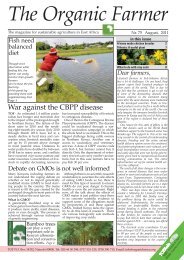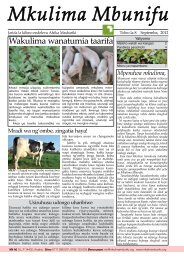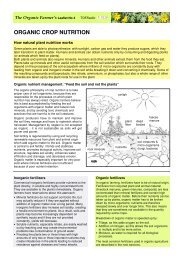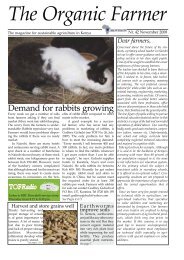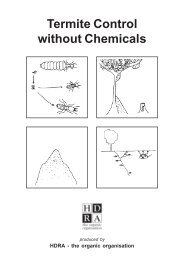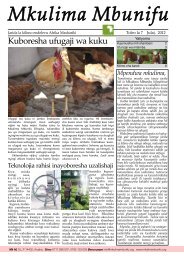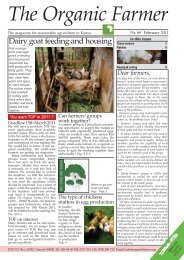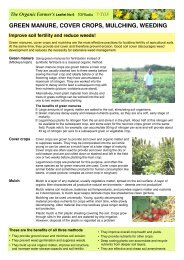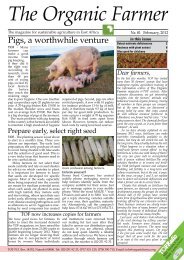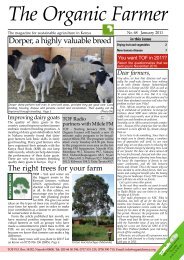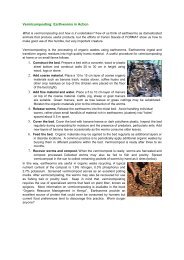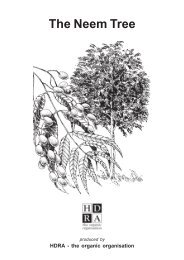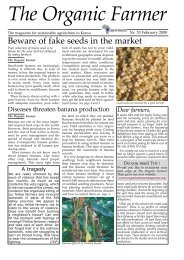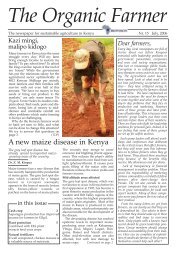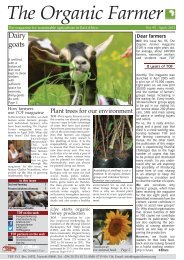Green manure is best fertilizer - Infonet-Biovision
Green manure is best fertilizer - Infonet-Biovision
Green manure is best fertilizer - Infonet-Biovision
You also want an ePaper? Increase the reach of your titles
YUMPU automatically turns print PDFs into web optimized ePapers that Google loves.
Nr. 27 August 2007<br />
Common mango varieties grown in Kenya<br />
A mango orchard should be kept<br />
clean to prevent pests and d<strong>is</strong>eases.<br />
Good care can improve productivity<br />
and income for farmers.<br />
The Organic Farmer<br />
Like other farmers, Linner Sigei from<br />
Bomet <strong>is</strong> interested in mango production.<br />
She has 50 grafted mango trees<br />
which are about four years old now,<br />
and wants to know if she can grow<br />
them organically. Yes, she can, as we<br />
have shown already in TOF January<br />
trolling the fruit fly...<br />
Continued from page 4<br />
the season at the onset of fruiting; the<br />
fungus can pers<strong>is</strong>t in the soil for over<br />
one year. Additional research <strong>is</strong> still<br />
being conducted on the appropriate<br />
formulation and the product should<br />
be available in the near future for<br />
application by farmers to control the<br />
pests.<br />
Additional control methods<br />
Orchard sanitation: Poorly managed<br />
or abandoned orchards and a variety<br />
of wild hosts can result in a buildup<br />
of fruit fly populations. Orchard<br />
sanitation, which entails the collection<br />
and destruction of all unwanted<br />
fruits containing fruit fly maggots<br />
on the tree and on the ground, can<br />
significantly to reduce damaging fruit<br />
fly populations in the orchard. Th<strong>is</strong><br />
<strong>is</strong> a very laborious exerc<strong>is</strong>e, but can<br />
be quite effective if the fruits are collected<br />
regularly and destroyed twice<br />
a week for the entire season. The collected<br />
fruits should be destroyed by<br />
either burning, burying (at least 50 cm<br />
deep), or putting them in tied plastic<br />
bags and exposing them to the heat of<br />
the sun for a few days until the fruit <strong>is</strong><br />
rotten and all the maggots in the bags<br />
are dead.<br />
Mechanical fruit protection: Wrapping<br />
or bagging of individual fruits<br />
with newspaper or plastic bags to<br />
prevent adult fruit flies from laying<br />
eggs on the fruits <strong>is</strong> also a practice<br />
for producing fruits that are free from<br />
fruit flies. To be effective, the fruits<br />
must be wrapped or bagged well<br />
before fruit fly attack, at least one<br />
month before harvest. Although laborious,<br />
it <strong>is</strong> an effective method for<br />
expensive fruit species produced for<br />
export or fruits produced in backyard<br />
gardens for family use.<br />
*Dr. Sunday Ekesi <strong>is</strong> a Senior Scient<strong>is</strong>t at<br />
ICIPE and leads the fruit fly programme.<br />
2006 and as we report here again.<br />
<br />
shaped trees within the first four years<br />
and do not require pruning unless<br />
there are excessive branches or unless<br />
they acquire an unusual shape. The<br />
orchard should always be kept clean<br />
to prevent pests and spread of fungal<br />
d<strong>is</strong>eases. The most common d<strong>is</strong>eases<br />
are powdery mildew and anthracnose.<br />
Powdery mildew <strong>is</strong> a serious<br />
<br />
in Kenya. Infections can lead to complete<br />
crop loss. Anthracnose <strong>is</strong> also a<br />
common d<strong>is</strong>ease limiting production,<br />
especially in areas with high humidity.<br />
Farmers growing mangoes conventionally<br />
could use chemicals such<br />
as Benomil or sulphur mixed with a<br />
sticker. For those growing mangoes<br />
organically, copper oxychloride may<br />
be used to control these d<strong>is</strong>eases.<br />
Fertilizer application<br />
For farmers who prefer growing<br />
<br />
compost can be applied every one or<br />
two months around the tree following<br />
the drip line (where the tree’s absorption<br />
roots are located). Farmers must<br />
be careful not to apply too much<br />
compost, as th<strong>is</strong> tends to promote<br />
rapid tree growth at the expense<br />
of flowering and fruiting. For the<br />
mangoes to be certified as organic,<br />
the orchard has to be inspected to<br />
ensure all certification requirements<br />
are met. It <strong>is</strong> recommended that soil<br />
and leaf samples are taken for analys<strong>is</strong><br />
before any <strong>fertilizer</strong> application<br />
<strong>is</strong> done in order to know the plant’s<br />
nutrient requirements.<br />
Kent variety: The Kent variety has a<br />
<br />
or crimson blush on the shoulder. Its<br />
flesh <strong>is</strong> juicy, melting deep yellow and<br />
fibreless, with a rich flavour. The Kent<br />
tree <strong>is</strong> large and vigorous with a dense<br />
<br />
and <strong>is</strong> suitable for export.<br />
Ngowe Variety: Ngowe <strong>is</strong> the most<br />
easily recogn<strong>is</strong>ed of the local mango<br />
varieties. Ngowe mango trees are<br />
comparatively small and round in<br />
shape. The fruit <strong>is</strong> good for commercial<br />
production and export, however<br />
the tree <strong>is</strong> susceptible to powdery<br />
mildew.<br />
Haden variety:<br />
Because of its good<br />
quality, seeds from<br />
the Haden variety<br />
are used as parent<br />
for several other<br />
varieties of mangoes. It produces<br />
medium to large-sized fruit and <strong>is</strong><br />
very juicy with a pleasant aroma.<br />
The Haden variety has an attractive<br />
appearance and <strong>is</strong> suitable for commercial<br />
production.<br />
Tommy Atkins variety: The Tommy<br />
Atkins variety has become an important<br />
commercial variety. It has a firm,<br />
<br />
moderate fibre and pleasant aroma. It<br />
<strong>is</strong> good for export because of its longer<br />
shelf life. It can also res<strong>is</strong>t anthracnose<br />
and powdery mildew.<br />
Apple Variety:<br />
Th<strong>is</strong> variety originated<br />
from the<br />
Kenyan coast. It<br />
has a rich yellow/<br />
orange colour when<br />
<br />
to large fruits that are<br />
round in shape and<br />
smooth in texture and<br />
that do not have fibres.<br />
The tree <strong>is</strong> susceptible to anthracnose<br />
and powdery mildew.



